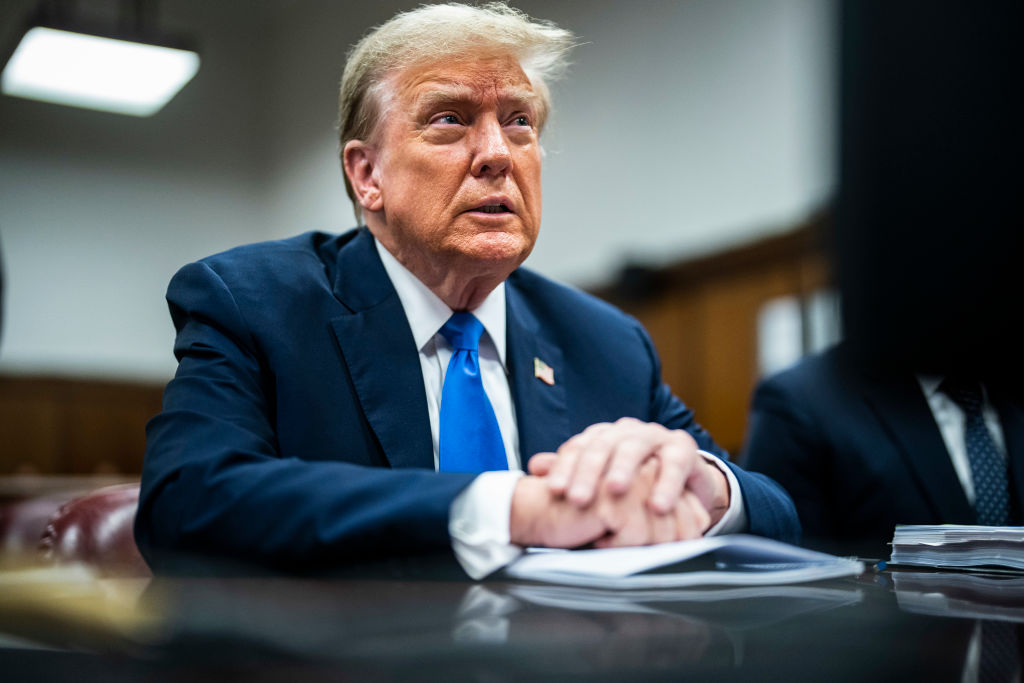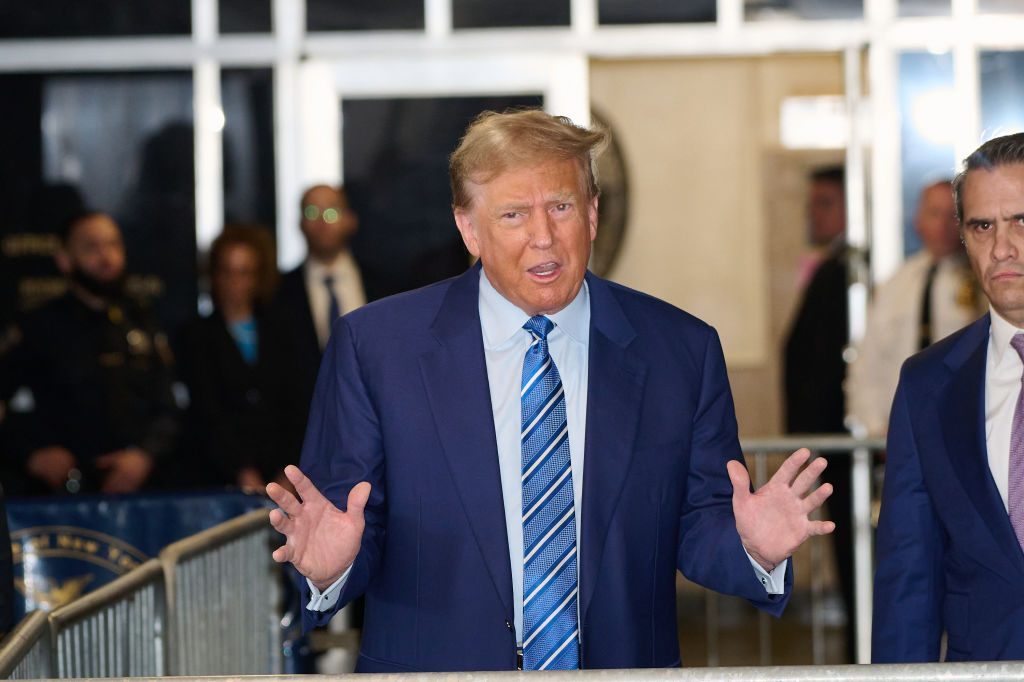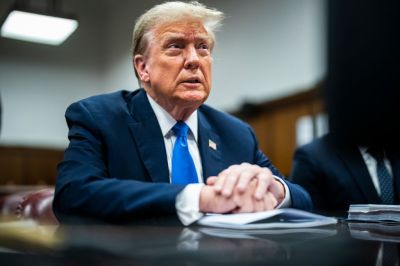Welcome back to The Collision! We launched this newsletter last year in anticipation of weeks like this one. We’ve been following the start of Donald Trump’s first criminal trial closely, and, although plenty of interesting and humorous details have emerged from the courthouse in Manhattan during jury selection, we’re going to focus today on a few aspects of the case that will actually matter in the long run.
The Docket
- Trump’s trial kicked off on Monday with Judge Juan Merchan setting an April 24 hearing date to determine whether Trump should be held in contempt of court for violating a gag order. Merchan had barred Trump from speaking publicly about witnesses, court staff, or opposing counsel, and prosecutors argue he has done just that on social media—including in one post on Monday morning going after key witness and former Trump attorney Michael Cohen.
- Although Merchan has designated Wednesdays as off days for this trial, Trump must attend next Wednesday’s gag-order hearing. Merchan appended a warning in bold at the top of his order: “YOUR FAILURE TO APPEAR IN COURT MAY RESULT IN YOUR IMMEDIATE ARREST AND IMPRISONMENT FOR CONTEMPT OF COURT.”
- Meanwhile, seated jurors are already beginning to drop out. On Wednesday, one juror who had been selected the day before called the court to say she was worried she could not be impartial. Merchan dismissed her on Thursday after a brief meeting in court, during which the juror said her identity had been partially revealed.
- Prosecutors raised issues about a second seated juror on Thursday who they say may have lied during voir dire, the questioning of potential jurors, about whether he or a loved one had been arrested. Merchan dismissed this second juror Thursday afternoon, meaning there are only five seated jurors and seven more needed to complete the panel.
- Merchan has issued a warning of sorts to journalists covering the jury selection process to protect the identities of potential jurors. “I’m directing that the press simply apply common sense and refrain from simply writing about anything that involves physical descriptions,” Merchan said.
- CNN on Monday obtained a letter sent by the White House to House Oversight Committee chairman James Comer making clear that President Joe Biden will not testify as part of the House’s impeachment inquiry. “Your impeachment investigation is over,” White House lawyer Richard Sauber wrote. Comer, in response, labeled Biden’s rejection of his committee’s invitation “unfortunate.”
How Trump Could Avoid a Conviction in Manhattan

Juries decide questions of fact, not law. So what facts will the jury in Donald Trump’s Manhattan trial be asked to decide exactly?
Remember, Manhattan District Attorney Alvin Bragg charged Trump in April 2023 with 34 counts of falsifying business records, all stemming from payments Trump made to his then-lawyer Michael Cohen. Trump recorded these payments in business records as legal retainers, but they were in fact reimbursements to Cohen for hush-money payments to Stormy Daniels—a porn star who claims she had an affair with Trump in 2006—and others. Because the statute of limitations for misdemeanor charges related to these payments had run out, Bragg indicted Trump on felony charges—meaning he will also need to prove that Trump made the false entries to cover up another crime.
To secure a conviction, therefore, Bragg will need to prove beyond a reasonable doubt that Trump falsely classified the payments to Cohen as a legal retainer because he believed that recording the real reason for the payments could implicate him in possible election or tax crimes.
This means that the jury will need to find—unanimously—that they were presented evidence proving beyond a reasonable doubt that:
- Trump falsified business records;
- He did so with the “intent to defraud” (as in, he knew the records were false and didn’t want other people potentially reading the records to know the true nature of the payments); AND
- Trump’s purpose for falsifying the business records was to cover up another crime.
Note that the prosecution does not need to prove beyond a reasonable doubt that Trump actually committed those other crimes, whatever they may be. It only needs to prove that Trump believed he may have committed other crimes and was creating these false entries to cover his tracks.
So how do Trump and his legal team stave off a conviction?
First, they can convince a juror—they only need one—that these really were routine legal payments to Cohen and not reimbursement for the hush money payments to Daniels. That’s going to be a hard row to hoe. Cohen is going to testify that there was no way he was paying Daniels $130,000 out of pocket and that he’s got plenty of receipts, as the kids say, but also literal receipts that he submitted for reimbursement.
But the prosecution does have one problem. Cohen is the star witness in the case—and he’s not the most reliable guy. Cohen has admitted to lying in court, pleaded guilty to lying to Congress, and evaded taxes for years. The defense will also have endless examples of Cohen lying to the media and public. In short, Cohen is a crook’s crook.
We can expect Cohen’s cross-examination to be brutal. As part of accepting a plea deal in 2018, for example, Cohen testified under oath that he had committed tax evasion. But last fall, he testified again—also under oath—that he had not committed tax evasion, which led to this fun little exchange:
Lawyer: “So, sir, you lied at the time—you lied more than once in federal court, correct?”
Cohen: “Correct.”
He’s every defense attorney’s dream for a main prosecution witness!
There’s also Cohen’s book deal. As the defense will no doubt put it, the guy destroyed his reputation within Trump World by flipping on his former client, so he switched teams to ingratiate himself to anti-Trump World, instead. In fact, proving the point a little too well, Cohen first pitched a pro-Trump book and said he was promised a $750,000 advance until his legal problems started mounting. His subsequent anti-Trump books have probably earned him more than $1 million.
Second, Trump’s team will try to convince the jury that Trump wasn’t falsifying the business records to conceal some election crime—he was doing it to conceal his infidelity to his wife! After all, if covering up a crime was the point, he didn’t do a very good job. We’re here at a criminal trial now, right? The payments were in the correct amount and they in fact went to Cohen. The paper trail wasn’t exactly hard for the prosecutors to find. The false part—the why the money was going to Cohen—was to prevent Melania, his third wife, from leaving him.
Then again, this is one of the many crimes that Cohen already pleaded guilty to: He admitted to paying the money to influence the 2016 presidential election, and that “he coordinated with one or more members of the campaign, including through meetings and phone calls, about the fact, nature, and timing of the payments.” But Trump’s team will likely say something to the effect of “Cohen is an idiot and pleaded guilty to something that wasn’t a crime”—especially since Cohen himself now denies that he committed a tax crime to which he had previously pleaded guilty.
This takes us to Trump’s mental state. For Trump to have falsified the business records to conceal a crime, he had to believe he might be committing another crime. But if the prosecution argues that second crime was campaign-finance related, that’s going to be a fight, too. So how can it be a crime if you don’t use campaign funds?
Under existing election law, candidates can’t use campaign funds for an expense that would exist anyway—even if it benefits the campaign. Dry cleaning is an obvious example. Maybe you wouldn’t be wearing so many suits if you weren’t out on the campaign trail, but that doesn’t matter. Buying fancier suits to run for office? Nope. Painting your home before holding a press conference in front of it? Definitely not.
And remember, Trump didn’t use campaign funds to pay the hush money. So the argument has to be that this was a campaign expense and not using campaign funds was a crime.
So to put it another way, using campaign money to pay hush money to a porn star is a crime if you paid the money so your wife wouldn’t find out—even if the only reason the porn star is trying to sell her story now is because you’re running for president. That’s not what Trump did, though.
The prosecution will argue that Trump didn’t care about whether his wife found out, he cared about whether the American people found out right before the election—and that the timing of the payments bears that out. In fact, the prosecution has Trump telling Cohen not to pay any money after Election Day because it wouldn’t matter after that. But the defense will read all that another way. Assuming Trump lost in 2016 (as both he and just about everyone else were expecting at that point), then Daniels’ story—as well as the stories of other people who were paid to keep quiet—would have been worthless so there was no need to pay them to keep it quiet.
And it seems like a real problem that the prosecution would have had a good case either way. If Trump had used campaign money—and to be clear, he didn’t—to pay for the hush money, a prosecutor could have charged him and argued he paid the money to prevent his wife from finding out. But since he didn’t use campaign money, a prosecutor can indict him and argue he paid the money to help his campaign. Is this the way the law is supposed to work, where a candidate is guilty no matter what money he used?
A lot of people may feel that Donald Trump did something wrong—he was paying off a porn star right before an election—so what does it matter? But it isn’t illegal for a federal candidate to pay hush money. It isn’t a felony to falsify business records in and of itself. So it should matter.
All it takes to block a conviction is one juror holding out. If members of the jury announce following deliberations that they can’t reach a unanimous verdict, the judge can give them an Allen charge, sending them back to essentially try again. But that would be a controversial move, as it is often viewed as a judge pressuring the holdout to join with the majority.
All that being said, this case would probably be a pretty quick conviction under normal circumstances. But imagine the incentives for a potential holdout: a book deal, traveling the country giving paid speeches to MAGA crowds, the prime-time interview on network television … and that’s just the beginning.
Trump Takes Advantage of the Media Spectacle

On Monday morning, as Donald Trump’s trial was about to begin, Jason Miller—the longtime senior Trump aide and a reliable window into the former president’s thinking—tweeted out a collage of screenshots from nine different television networks. Most channels were showing Trump speaking to reporters outside the Manhattan courthouse. Each chyron indicated the Trump trial was the main news story on each network. Some were calling it the “hush money trial,” which is not the preferred term in Trump World. The chyron on reliably pro-Trump Newsmax, however, was quoting Trump’s words to reporters that the trial was “political persecution.”
But Miller didn’t seem to care about the details themselves. His caption said it all: “Wall to wall.”
As his Manhattan trial proceeds over the next few weeks, the Trump campaign’s media strategy is to embrace the circus, focus attention on the former president, and cast his opponents in the courtroom as political actors unfairly using the trappings of the judicial system to hurt him. The plan follows a tried-and-true approach to public relations that Trump has employed since his days as a New York tabloid mainstay: When the cameras are focused on him, everything else will fall into place. It’s total media war.
With the trial kicking off, Trump will be at a disadvantage as the general election campaign keeps rolling forward. Judge Juan Merchan’s schedule, which includes an off day in the middle of the week to accommodate his obligations to other cases, means the presumptive Republican nominee will be off the trail and stuck in Manhattan for most of the next six weeks or so. In fact, expect to hear a lot more about how unusual and unfair this schedule is, a politically motivated way of targeting a leading presidential candidate.
It will help that Trump is being tried in New York, the media capital of the world. The array of cameras and army of reporters both in and outside the courtroom will give the former president and his team plenty of opportunity to exploit journalists’ need for new sound and video. That may often look like Monday’s pretrial press availability outside the courthouse, but it will also mean regular gaggles with reporters at 40 Wall Street, the skyscraper in Lower Manhattan whose leasing rights Trump owns, at the end of the day after the court adjourns. How many criminal defendants can hold impromptu press conferences not on the courthouse steps but on their own turf?
There’s also the spectacle of the trial, which will bring out fans and onlookers, as happened outside a Harlem bodega on Tuesday when Trump made a brief stop after his day in court to highlight violent crime. The crowd greeted him with chants of “four more years” and “Trump! Trump! Trump!” and the cameras were rolling.
During these press availabilities, Trump and his team will reiterate to the media all the ways they see Bragg’s case as unfair and illegitimate: the felony charges without an underlying crime, the belated prosecution but rushed trial, the political bias of an elected district attorney in one of the most Democratic jurisdictions in the country. While his lawyers will be assailing the prosecution’s case before the judge and jury, Trump will be assailing the prosecutor himself.
Where they’ll have to be careful, The Dispatch has been assured by a person familiar with this thinking, is on criticizing witnesses, the judge, the jury, or practically anyone else associated with the court itself. The gag order we discussed in The Docket, however unusual in its scope, remains in place. The consequences for violating that order and being held in contempt of court could include jail time but, in this case involving a former president, will likely be limited to fines.
So far, however, Trump has been anything but careful about avoiding potential violations of the gag order. He posts frequently on Truth Social, going after members of the jury pool, the jury selection process, and the trial schedule. He’s even complaining about the gag order itself.
Here is where Trump’s media strategy runs head first into the supposed constraints of the judicial system, which appears ill-equipped to deal with a total-war mentality. The gag order has not curbed Trump at all and has, in fact, bolstered his own media strategy of maximizing outrage and painting himself as the victim.
That’s the strategy, but can it be sustained as the processes of the trial give way to the substance? At a certain point, unsavory facts about Trump’s operation—how he negotiated the hush-money payoff scheme, what was said in conversations about Stormy Daniels, or how the revelations could hurt Trump’s 2016 campaign—will be discussed in court. What a media-available Trump has to say in response to questions about those facts will almost certainly pull him off his preferred message of political persecution. And at that point, wall-to-wall coverage might look a lot less advantageous for the former president.
Verbatim
“I won’t tolerate that. I will not have any jurors intimidated in this courtroom.”
– Judge Juan Merchan to Trump attorney Todd Blanche after the former president reacted physically and verbally to one potential juror, April 16, 2024
Also Verbatim
“I do not watch any podcasts.”
– A prospective juror during voir dire, describing how he consumes news, April 18, 2024







Please note that we at The Dispatch hold ourselves, our work, and our commenters to a higher standard than other places on the internet. We welcome comments that foster genuine debate or discussion—including comments critical of us or our work—but responses that include ad hominem attacks on fellow Dispatch members or are intended to stoke fear and anger may be moderated.
With your membership, you only have the ability to comment on The Morning Dispatch articles. Consider upgrading to join the conversation everywhere.